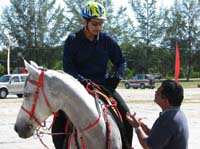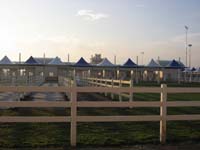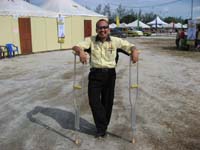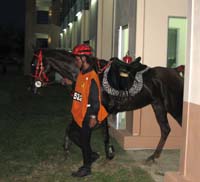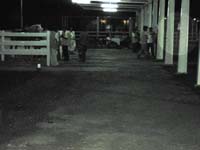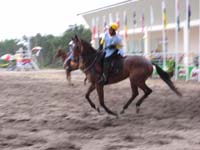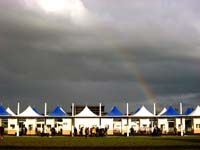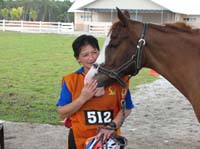
|
Sultan's Cup Website FEI Event Schedule 

Sultan Mizan Zainal Abidin  Sultan Mizan and Endurance  Terengganu Endurance  Terengganu Tourism About Terengganu About Malaysia Weather in Kuala Terengganu
|
Malaysia Wrap-up, Part 1: The FEI EffortMalaysia - Ride StoryComplete ResultsMalaysia Wrap-up, Part 1: The FEI EffortThe two strongest impressions I have of the event are
Brook Sample, me, Jeanne Linneweever,and her husband Charles, Paul Jeffrey,
and Kevin James. Paul Brown (Australian trainer for the Royal Stables)
joined us later, and John Crandell III wasn't able to stay for the lunch,
but had spent time earlier talking with Jim and Halvard. The discussion, the
intensity, the honesty and sincerity - this was really a tremendous
discussion. Everybody was a little tired from the ride, but well aware of
how important the discussion was - in terms of Malaysian effort to host the
WEC, and for the health and credibility of the sport of FEI Endurance
competition. We had some general talk, the obvious - but 'fixable' problems
(timing system was slow, traffic flow in and out of vetgate was somewhat
chaotic), the obvious successes (completion rate, well marked course) and
the general conditions of heat and humidity throughout the event
Then Halvard asked that each rider take a few minutes and summarize their opinion of the event, and address the suitability of the event for a 2008 WEC. This was really an amazing session. These were World Class riders, every rider at the table had represented their country at a World Endurance Championship, some more than once, and the views and opinions were so keen, so honest and open, and so refreshing! So often it seems that WEC's are overshadowed by politics and staff and Federation in-fighting and wrangling, but to hear things straight from the mouths of the athletes, the individuals who actually lay it all on the line and make the mile by mile decisions about how to best navigate a 160km course - how to capture the best possible performance of their horse for their Federation, yet mile after mile keep the health and welfare of the horse at the forefront - do your best for your country, but don't cross the line - don't demand too much of your horse. This is so obiously the essence of the sport, and something that seems to be frequently lost in the politics of WEC Federations. The riders too often lose their voice, and all the staff in the world can't substitute for a brilliant horse and rider performance. Most of the riders had similar opinions - yes, it can be done, but absolutely caution must prevail. The ride will be about pacing and strategy, speeds seen at other venues will not be attainable here. The course was basically good - well marked, good footing, although some changes could be made regarding loop layout: less repetition, more variety. Perhaps a shorter loop in the beginning to separate the caliber of horses sooner? Though riders disagreed on this - some preferred the traditional longer first phases (30-40km), some thought 30 was perfect, some thought 20 or 25 might help control the early speed. Perhaps shorter holds in the beginning? Most agreed that the overall amount of holds was appropriate (5 hours total hold time - 6 holds of 50 minutes) - but that the earlier holds could be shortened, possibly add the extra time later in the day. The flat course was good for night riding, and night riding itself was fine. Although the terrain itself was non-technical, the actuality of riding at night created another level of difficulty, in essence forcing riders to go slower in order to ride safely. It was good to have the first loop in the daylight, a chance to take some of the freshness out of the horses before dark, a good way to span the coolest (darkest) times of the competition day. The rain was generally a blessing - cooling the horses and riders, generating some breeze as the storms moved in and out. The track got a little sloppy from rain and hoof, but this could probably be improved, and minimized by having less repeat trail. Generally the concensus was that having the event during the rainy season was a good plan. The water and steward points along the trail were adequate, though maybe having some troughs on the trail with ice water for cooling would be good, and having more stewards who could pass water up to the riders to help cool the horses (rather than having to dismount to douse the horses). The cooling fans and ice troughs at the vet gate were good - though there needed to be warm water for horses to drink as well as ice water for cooling. The crewing areas were good - plenty of space, maybe more fans in that area would be good. Generally the venue, the Endurance Park, was excellent - well planned and functional. There were a few more details discussed and suggestions made. Open discussion, positive discussion, So very encouraging to see the calm intelligent discussion, the apparent lack of 'agenda' - the honest desire to give a fair evaluation of the ride. After each rider gave their summary, the discussion turned to more general FEI Endurance topics. Some hint of the need to evaluate the sport and address the concerns of other FEI disciplines and the general press. I figured this was a good time to ask my same question to people whose experience as riders and veterinarians and officials would give real depth to the discussion - "is 160km the right distance for a WEC?" The answers were varied - some were adamant about the tradition - 160km is the true test of Endurance the only way to test world class athletes. Some said they preferred 160km but felt that eventually the WEC's would probably go to 120km. Some felt that 160km was indeed too far for a high stakes (high speed) high publicity Endurance competition - where asking horses to give everything for 160km was too much. Would 120km be better? Faster? yes. More dangerous? maybe. Less risk of injury and exhaustion for the horse? probably. More humane? probably so. Would it favor the 'crazy, daring' competitors? maybe. Drawing from experience as riders, and from experience as vets.
Another idea is that of stopping the competition, stopping the clock, at a certain point. For instance after the first 30 horses have crossed the finish line, the competition is over. For purposes of team calculations, the competitor's times would be calculated based upon where they were when the clock stopped (e.g. the 5th vetgate was that last official time). All competitors still in the field at the time the clock stops have earned a completion - a progressive finish completion. The point of this idea is to avoid the need for riders to drag tired horses around the course simply in order to earn a completion. To avoid the injuries and fatigue that many horses (in this case the less elite athletes) experience in the final miles of competition. The best horses will finish within a certain time percentage of each other, the rest can stop at some point without the (unneccesary) stress of getting through those last miles, when the race is basically already over. Very interesting concept. I guess the thing that impressed me the most about all of this was the dedication to the sport that was evident. It is a wonderful sport, a sport that has captured much of the world, mixing all classes of riders, all races and religions, more so than any other FEI sport. It is worth preserving, and worth spending time and energy to make it worthy of all equestrians' respect. Steph
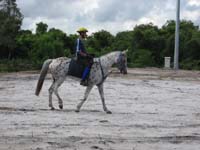
ArrivalsWe arrived last night after a long trip, met up with Leonard Liesens, and Paul Jeoffrey (New Zealand) - were met at the Terengganu airport and shuttled off to the Suria Beach resort - a modest little resort on the coast where the riders are being housed. Hot and humid - the warm coastal air was a shock after hours of airplane and airports. A little smokey from the open markets, and very very humid. It had rained during the afternoon, everything was still wet and steamy. A night drive along the coast from the airport to the hotel - images of Terengganu - the first images are always the most interesting, before the newness wears off. [More ...]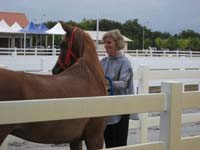
Getting ReadyA little time to write, just a bit. We went out to the stable early this xmorning to try the horses out. Woke up to pouring rain (the kind that will deafen you if you're standing in a tin roof barn) but it soon stopped, and was already drying up by the time we went to breakfast. Sunny and gorgeous when we got there. I brought a saddle with me (the Gaston Mercier - which is very very light for travel and seems to fit most arabs reasonably well) and provides a degree of comfort and familiarity which is quite welcome when riding strange horses! My horse is 'Murphy' - nice horse, smooth gaits, a little young and playfully rambunctious, but I think he'll be a good ride. [More ...]Sultan Mizan and Endurance Malaysia is a federal constitutional elective monarchy, modeled after Great Britain (much of Malaysia experienced British colonial rule between 1786 and 1957 when Malaysia gained independence). It is nominally headed by the Paramount Ruler or Yang di-Pertuan Agong, commonly referred to as the King of Malaysia. The Yang di-Pertuan Agong is selected for a five-year term among the nine hereditary Sultans of the Malay states. Sultan Mizan Zainal Abidin, the 16th Sultan of the state of Terengganu will be the next King of Malaysia, to be crowned December 13, 2006. 
Sultan Mizan is an accomplished equestrian, and his passion for riding has propelled Malaysia into the world of FEI Endurance. Malaysia's history with Endurance began with the 1998 WEC in Dubai, and now with the Sultan's additional backing, the sport is being actively promoted: venues, riders, International competition, all is escalating. The FEI granted (provisionally) the 2008 World Endurance Championship to Malaysia. The 2008 WEC would be hosted by Sultan Mizan in his home state of Terengganu (pronounced tren-ganu). He has an active stable of Endurance horses, and is building the Terengganu Endurance Village to host rides. The sport is still fairly young in Malaysia, and the country is still developing a pool of horses and riders, particularly horses capable of 160km competitions. There have been a few 160km events to date, but the general shortage of high caliber horses has made it difficult to determine a standard for competition at the 160km championship level. Rides are generally run in the cooler hours of the night, but even so it may not be possible to apply FEI's current championship speed standards (12kph minimum to qualify) to competition in the tropics. The November 25/26 Sultan's Cup will be another test of championship level Endurance. But the shortage of 160km horses in the country will still pose a problem since the nation's top horses are being prepared for the Asian Games in Qatar in mid-December. But aside from the need to test the 160km venue in Malaysia, the Sultan's Cup will be a celebration: of Terengganu, and Malaysia's new King. (photo from TheStar Online)
Terengganu Endurance S.M.Z.,A.M.T.,B.V.Sc. & A.H., Cert V. Opthal & Eq. Surg. (Syd), Dr. Balakrishna Polanaidoo or best known to all as Dr. Bala, is one of the most experienced equine veterinarians in Malaysia and is a member of International Treating Veterinarians Association (FEI). He was the pioneer in the Equine Endurance and he actually introduced this sport to Malaysia. In 1998, when Malaysia was first invited to participate in the World Endurance Championship in Dubai, he went in quest of knowledge of this sport. With almost 8 years experience in this sport has given him an opportunity to develop this sport locally and encourage more riders to take part in endurance. Dr. Bala has represented Malaysia as the team/treating veterinarian in numerous prestigious events including the 13th Asian Games held in Bangkok, Thailand in 1998, the 14th Asian Games in Busan, Korea in 2002, treating veterinarian for the 21st South East Asian Games 2001 in Kuala Lumpur, team veterinarian at the 22nd SEA Games 2005 in Manila, Philippines etc. He was the president of the Veterinary Commission for the KL Grand Prix 2003 and 2004. He also officiated as the member of veterinary team at the Sydney Olympics 2000. He was nominated as the President of the Veterinary Commission for the Word Cup South East Asia Leagues 2001, 2002 & 2003, 2004, 2005 and the current year for the Malaysia (CSI-W), (FEI). Besides the World Endurance Championships in Compeign, France, he also officiated at several other endurance events in UK, Spain, Portugal, Germany as well as the Tom Quilty 160km Gold Cup yearly event in Australia. He represented Malaysia as the team vet for the Malaysian Team participating in the Dubai World Endurance Championship in January 2005. Dr. Bala is well travelled and has wide knowledge in Endurance Sports Medicine. He has attended post graduate training in some of the most respected veterinary universities all over the world, ranging from courses in Medicine, Surgery, Dentistry, Respiratory Diseases, Equine Endurance, Opthalmology and, most imperitive in Malaysia, Foot Care. In recognition of his contribution for Equine Sport Medicine, in the year 2003, he was awarded the Best Equine Sport Veterinarian by the Prime Minister Datuk Seri Abdullah Ahmad Badawi and he is also the Team Manager to the Royal Terengganu Endurance Stables. He headed the Veterinary Commission for the most prestigious FEI Event this year i.e. World Cup Show Jumping Final 2006. Paul James Brown
Paul is the chief Endurance Trainer of the Royal Stables. Australian born, Paul joined the Royal Stables in 2005. He oversees the training and preparation of the horses for International competition as well as competitions in Malaysia.
|
Image Gallery
|
Contact steph@endurance.net to publish additional comments or photos on this page.
| || Back to Malaysia - 2006 Sultan's Cup Terengganu Coverage || | || Back to Endurance.Net || |
Event Coverage Sponsorship:
 |
 |
 |

 On the day after the ride the FEI delegates and the foreign riders met for
lunch at the Sutra Beach Resort (where most of the invitees were staying).
Dr. Jim Bryant, Dr. Halvard Sommerseth and John Robertson were FEI officials
of the event, and were also closely monitoring the ride in order to prepare
a report for the FEI: can Malaysia manage a World Endurance Championship,
and can the horses and riders handle a WEC competition in the tropics? Dr.
Bryant and Dr. Sommerseth had asked the riders to join them for lunch in
order to discuss the event, ask questions of the riders and gain a greater
understanding of how to insure safetey and horse welfare: what went well?
what went wrong? what changes or improvements would we suggest?
On the day after the ride the FEI delegates and the foreign riders met for
lunch at the Sutra Beach Resort (where most of the invitees were staying).
Dr. Jim Bryant, Dr. Halvard Sommerseth and John Robertson were FEI officials
of the event, and were also closely monitoring the ride in order to prepare
a report for the FEI: can Malaysia manage a World Endurance Championship,
and can the horses and riders handle a WEC competition in the tropics? Dr.
Bryant and Dr. Sommerseth had asked the riders to join them for lunch in
order to discuss the event, ask questions of the riders and gain a greater
understanding of how to insure safetey and horse welfare: what went well?
what went wrong? what changes or improvements would we suggest?
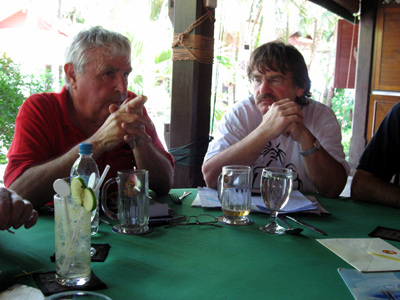 At the table were Dr. Jim Bryant, Dr. Halvard Sommerseth, Leonard Leisens,
Jim and Halvard threw out some other ideas that were being tossed around
among FEI heads. What about changing the concept of the event from one of
'progressive elimination' to 'progressive qualification'? Rather than
placing the emphasis on elimination - i.e. 'this horse is lame, it must be
pulled. this horse is exhausted, it has failed and must be withdrawn' -
Place the emphasis on qualification - 'i.e. this horse has passed the first
test and is qualified to continue'. 'these horses have passed the 4th test
and are qualified to continue'. It is a subtle shift in perception, but
actually very powerful. While the mechanics are still the same, the emphasis
is shifted to the athletes that pass, rather than those that haven't failed
yet. The press obtains a list of horses who have qualified for the 3rd
phase, rather than horses that were lame or exhausted at gate 2. This is a
concept that I really like - something I can wrap my brain around easily -
sometimes these subtle changes in perception can have surprisingly positive
results.
At the table were Dr. Jim Bryant, Dr. Halvard Sommerseth, Leonard Leisens,
Jim and Halvard threw out some other ideas that were being tossed around
among FEI heads. What about changing the concept of the event from one of
'progressive elimination' to 'progressive qualification'? Rather than
placing the emphasis on elimination - i.e. 'this horse is lame, it must be
pulled. this horse is exhausted, it has failed and must be withdrawn' -
Place the emphasis on qualification - 'i.e. this horse has passed the first
test and is qualified to continue'. 'these horses have passed the 4th test
and are qualified to continue'. It is a subtle shift in perception, but
actually very powerful. While the mechanics are still the same, the emphasis
is shifted to the athletes that pass, rather than those that haven't failed
yet. The press obtains a list of horses who have qualified for the 3rd
phase, rather than horses that were lame or exhausted at gate 2. This is a
concept that I really like - something I can wrap my brain around easily -
sometimes these subtle changes in perception can have surprisingly positive
results.
 Behind every event is a group of hard working individuals, who have the ability to keep sight of the goal - the big picture, as well as the details. Dr. Bala is one of the people committed to the success of Malaysia's Endurance program, and the success of Sultan's Cup event. Another individual who is key to Sultan Mizan's Endurance program is Paul James Brown, the chief Endurance Trainer of the Royal Stables.
Behind every event is a group of hard working individuals, who have the ability to keep sight of the goal - the big picture, as well as the details. Dr. Bala is one of the people committed to the success of Malaysia's Endurance program, and the success of Sultan's Cup event. Another individual who is key to Sultan Mizan's Endurance program is Paul James Brown, the chief Endurance Trainer of the Royal Stables.

